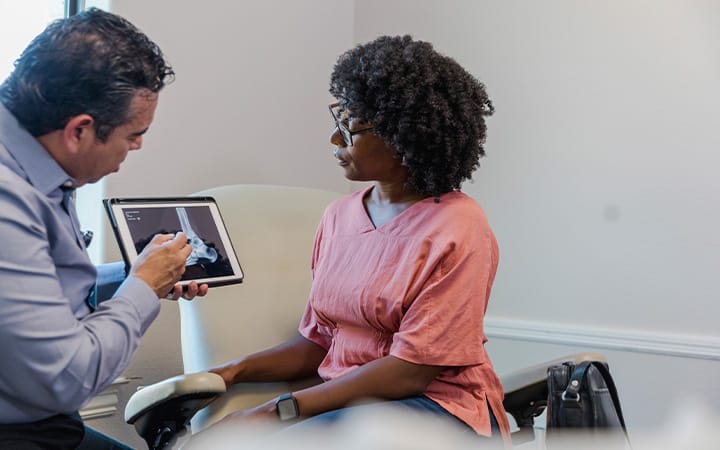‘Scanxiety’ Is Real: Here’s What Can Help
July 28, 2025

Anticipating a medical scan or the results of one can cause fear and worry – often referred to as “scanxiety.” Many patients experience these emotions before, during or after a CT scan, MRI or other type of imaging test.
“Some patients have a lot of anxiety around imaging tests, especially patients who have had cancer and if there are any signs of it coming back,” says University Hospitals Department of Radiology Chair Donna Plecha, MD, who specializes in breast imaging.
Aside from cancer, worry about scans can occur for any number of other medical concerns, like injury, abdominal pain, heart problems or neurological issues. “If it’s an athlete and we are looking for stress fractures that may put them out for the season, that could also be anxiety provoking,” Dr. Plecha says.
Signs of High Anxiety
Scanxiety is mild for some patients, but for others it can be disruptive. Signs may include:
- Trouble sleeping
- Loss of appetite
- Nausea
- Sadness
- Irritability and moodiness
- Difficulty focusing
- Increased heart rate
Scanxiety is common among cancer patients, who have scans to determine if a tumor has responded to treatment or whether a cancer has returned or spread. For some patients, repeated scans and follow-ups can trigger post-traumatic stress disorder (PTSD) symptoms before, during or after testing.
Anxiety about imaging scans and other medical tests are common and can be intense for patients as well as family members. It’s natural to worry about potential results and what it will mean for your health. If you’re gripped with fear and dread, those feelings can have physical and psychological effects and should not be ignored.
If scans cause severe distress that becomes difficult to manage, Dr. Plecha recommends discussing the issue with your physician or seeking professional counseling.
How to Manage Scanxiety
It helps to acknowledge fears and work on coping strategies. Writing down thoughts and concerns can help you process feelings and also prepare for appointments.
There is no one-size-fits-all approach to managing scanxiety. Exercise may be helpful for some people. Others may find spirituality or nature walks are beneficial.
- Distract yourself. Reading, socializing, or partaking in hobbies or other enjoyable activities are good ways to occupy your mind.
- Try relaxation techniques. Practice deep breathing, meditation or progressive muscle relaxation techniques.
- Tune out. Many patients listen to music or a podcast to relax during scans.
- Accept support and comfort from those around you. “We sometimes will use aromatherapy to help patients relax,” Dr. Plecha says. “We’ve used that when we do breast biopsies. We use Reiki therapy sometimes as well. Some of our nurses are trained in Reiki therapy to help relax patients.”
- Try to schedule your scan early in the day. This reduces the amount of pre-scan anxiety that may build up before the procedure.
- Prepare yourself. Write down questions and concerns as they occur to you. Ask your doctor what to expect during and after the scan, including next steps based on your scan results. Don’t hesitate to call or message your doctor if you want more information about the test or results.
- Ask how and when you will receive results. Some patients prefer to view results in MyChart, while others prefer to wait until their provider calls.
Related Links
The University Hospitals Department of Radiology provides a full range of diagnostic imaging and radiology services.
Tags: Anxiety, Cancer, Mental Health, Donna Plecha, MD


